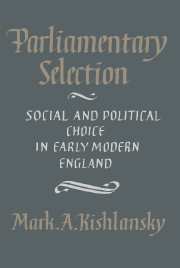Summary
This is a study in the social history of politics. It is a continuation of my interest in the nature of politics in early modern England – in the assumptions that underlay it, the practices that gave it form, and the structures through which it operated. Remarkably, given all the attention of preceding generations, we still have no very clear idea of the political process in the sixteenth and seventeenth centuries. The Marxist paradigm that politics is the history of class struggle has been too frequently disproved with regard to this historical period to command much attention. But in its place, residually, rests the assumption that politics is an instinctive activity that man brought to civilization from the state of nature. Homo politicus requires no special explanation and no critical treatment. His aspirations and his actions are historical constants readily explicable to anyone who has ever participated in a club, an educational institution, or a local council. And of all political instincts, none is more natural than the electoral one.
It is this assumption that I wish to challenge. I shall argue, instead, that politics is environmentally specific, that it is tied to its historical period and to its local context. Politics interacts with social organization and cultural categories, sometimes replicating them, sometimes throwing them into stark contrast. Political assumptions and political practices therefore change over time, and their changes can provide a window through which to view deeper social transformations.
- Type
- Chapter
- Information
- Parliamentary SelectionSocial and Political Choice in Early Modern England, pp. ix - xivPublisher: Cambridge University PressPrint publication year: 1986

